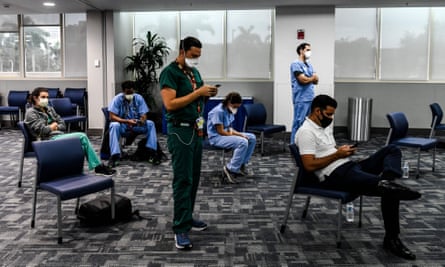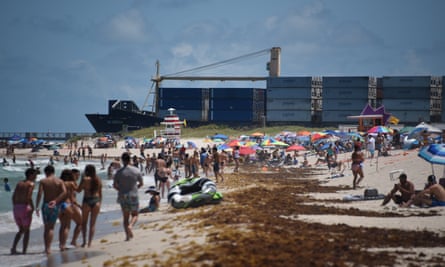The emergency department at Jackson Memorial Hospital, wedged between Little Havana and the vibrant murals of Wynwood in Miami, has overflowed with Covid-19 patients for weeks.
Patients wait for beds in hallways and in the lounge. Some need oxygen minutes after arrival, while others are sent home for bed rest and to quarantine. Intensive care unit beds, the number of which has already expanded, are “snatched” up minutes after they become available. Not a single one of the 164 in the hospital is free.
“The last three weeks have been some of the busiest shifts in my entire life,” said Dr Mark Supino of Jackson Memorial Hospital’s emergency department. “We’ve seen some of the sickest patients we’ve ever seen.”
Florida’s failure to contain coronavirus cases has put the state on track to rival New York’s peak for sheer volume of infections. This spring, New York represented one quarter of the nation’s Covid-19 cases.
New York state has recorded 405,000 cases, while Florida’s outbreak has 379,000 so far, according to a Johns Hopkins University tracker. But while New York’s latest daily case figure showed an increase of 811, Florida’s case total jumped more than 10,000 in a single day. More than 18% of Florida’s Covid-19 tests are coming back positive, indicating community transmission is “widespread and increasing”, according to the Kaiser Family Foundation.
But unlike the spring outbreak in New York, which was met with some of the strictest shelter-in-place orders in the country, Florida is open for business.
“We’re not going to restrict the businesses,” the Republican governor, Ron DeSantis, said on Thursday, at a press conference where he also claimed the outbreak in south Florida had “stabilized”.
DeSantis denied businesses, such as restaurants and bars, were contributing to the spread of Covid-19. However, scientific papers linked air-conditioned indoor dining to Covid-19 cases as early as January in Guangzhou, China, and US health officials describe Florida’s current restaurant openings as an “even more risk” scenario.
Nationally, emergency department cases plummeted in March, April and even May when most states imposed lockdowns. But the American College of Emergency Physicians said they are now returning to traditional levels.
That means car accidents, broken bones, heart attacks, strokes and all the odd and existential personal crises a normal urban emergency room sees are now topped with a wave of Covid-19 patients in Miami. Despite the outbreak, Florida has remained open, making every one of Supino’s shifts like a “mass casualty incident”.
“It’s not uncommon to have multiple ambulances coming back-to-back,” said Supino. “It’s like swimming for shore and not seeing shore.” The “disconcerting” unknown – when will it end? – is wearing doctors and nurses thin, he said.

One day this week, whole counties in Florida, many of them rural. lacked intensive care unit beds. Putnam county has no open slots in its 11-bed ICU. The eight ICU beds in Okeechobee were full. Similarly, none of Hernando county’s three critical care hospitals have available intensive care unit beds. Nor do the two critical care hospitals in Monroe county, in the Florida Keys.
“The Covid unit was a very tough unit to work,” said Barbara Murray, a nurse of 40 years who has spent the last couple of years of her career at a hospital in St Petersburg, which has also run out of ICU beds, according to state data.
To limit the spread, the hospital restricted who can enter the floor caring for Covid-19 patients, Murray said. Nurses have taken on the duties of cafeteria workers, who deliver meals, and lab workers, who draw blood, to reduce the number of people exposed to Covid-19 patients.
Murray was recently fired for “insubordination”, after she raised concerns about heavy patient loads. She is pursuing an appeal with her union, National Nurses United.
Florida’s high infection rate has also been recognized by pharmaceutical companies, who are now locating studies on experimental Covid-19 treatments there.
Miami’s Westchester hospital was the first location to announce it would trial ifenprodil, an experimental drug from Algernon, because Florida has “recently had a significant number of confirmed Covid-19 cases”, its chief executive, Christopher Moreau, said in a press release.
In reaction to this surge, the Federal Emergency Management Agency (Fema) announced it would send 1,500 nurses to Florida. Jackson Memorial in Miami was one of the hospitals that received them, as did some facilities in Tampa.
Meanwhile, the Covid-19 outbreak has also crept into the state’s many nursing homes. In the course of one month, infections among nursing home residents have tripled to nearly 5,000 residents, according to state data.
“When you’re dealing with nursing homes and assisted living facilities, you’re dealing with a lot of vulnerable people,” said Dr Joseph Ouslander, a professor of integrated medicine at Florida Atlantic University and a past president of the American Geriatrics Society. “It’s a tinderbox – one person can set the place on fire and kill a lot of people.”
Covid-19 has killed more than 140,000 people in the United States, including 5,300 in Florida. While New York state’s death toll, more than 27,000 people, is likely to be a worst-case scenario, this state has flattened the death rate, where Florida’s has risen by 100 a day for the last week.
“By the time we know about somebody who’s died, that’s a look in the rearview mirror of about five weeks,” said Jason Salemi, an associate professor of epidemiology at the University of South Florida college of public health in Tampa who has tried to push the state to improve data collection. “It’s not current enough to help us very much.
“Plus deaths are only the tip of the iceberg in terms of the negative outcomes that could happen,” said Salemi. They do not capture people suffering from the recently recognized long-tail effects of Covid-19. “People who have had Covid-19 two or three months ago are still experiencing a lot of adverse signs and symptoms, like difficulty breathing and fatigue.”
At the same time, restrictions on social activities in Florida are meek compared with north-eastern states. There is no statewide mandate to wear masks in public. In at least one hard-hit county, people can still eat inside at bars. Air-conditioned restaurant dining rooms are open, albeit at half capacity. Gyms, museums and retail stores are open. By comparison, gyms, museums and indoor dining are still closed in New York City, despite its far firmer grip on the outbreak there.
“The absolute social irresponsibility of people … is causing the problem,” Ouslander said. “People have to be looked in the eye and told, ‘It’s true – we understand the mask is uncomfortable, social distancing is difficult, we understand that, and we understand you have a very low risk of getting sick, but you could infect other people and kill them.’”

Not everyone agrees people are being irresponsible. Ouslander also believes Florida officials made a “reasonable effort” to keep people safe. And nurse Martin Peebles, who works at Largo medical center, said he believes people in his neighborhood are making an effort to be careful and wear masks.
Even as Supino and his colleagues struggle through the day-to-day – trying to prop each other up – he empathizes with Floridians.
“This is difficult for everyone,” Supinon said. “I don’t want to gloss over the economic impact … Even if they aren’t getting sick, to have your livelihood torn away from you by this virus is saddening.”
But there is evidence, despite Governor DeSantis’s best efforts, that reopening while the virus surges will not improve the economy. On Thursday, Florida posted the largest single-week increase in unemployment claims nationally, with more than 65,000 seeking unemployment benefits.
“I definitely understand this desire people have to kind of move on and reopen,” he said, “but it’s so difficult to have a healthy economy when people are sick.”
This article was amended on 24 July 2020 to correct the name of Jackson Memorial Hospital.
